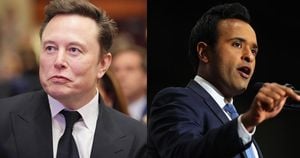Jamie Oliver, the well-known British celebrity chef, has found himself embroiled in controversy following the release of his children's book, "Billy and the Epic Escape." The newly launched narrative has been pulled from shelves after facing significant backlash concerning its depiction of Indigenous Australians.
The book hit stores back in May and quickly stirred up heated discussions, especially among Indigenous communities. Leaders from these communities criticized the book for misrepresenting their cultures and perpetuating stereotypes, which they deemed harmful to their history and experiences.
Oliver expressed his distress over the growing criticism, stating he was "devastated" by how the story was received, making it clear it was never his intention to cause offense. Despite these intentions, many felt the portrayal within the book trivialized the serious issues faced by Aboriginal and Torres Strait Islander peoples.
At the heart of the story is Ruby, the First Nations character who becomes the victim of abduction by the main antagonist, raising concerns about how the narrative shifts blame onto Ruby’s family. The National Aboriginal and Torres Strait Islander Education Corporation (NATSIEC) highlighted these issues, arguing this framing minimizes the deep, historical trauma associated with Australia's past policies of child removal.
NATSIEC criticized the book for being "culturally insensitive and harmful," expressing concerns the book inadequately represented language diversity by mixing various Indigenous languages, reinforcing the stereotype of Indigenous Australians as being a homogenous group.
Penguin Random House U.K., the publisher of the book, responded swiftly to the backlash, announcing its decision to withdraw the book entirely. A spokesperson from the publishing house stated, "Our mission at Penguin Random House UK is to make books for everyone and with our commitment, we recognize our responsibility. It is clear our publishing standards fell short on this occasion, and we must learn from this and take decisive action."
This incident highlights how Oliver’s narrative inadvertently echoed the painful legacy of Australia’s forced adoption policies, which left decades of intergenerational trauma. Activists noted the book perpetuated stereotypes about First Nations families, implying they neglect their children for monetary gain.
Subsequently, Jamie Oliver also issued his own statement, apologizing wholeheartedly and emphasizing he never intended to misrepresent such difficult issues. He acknowledged the decision to withdraw was made after consulting with his publishers, recognizing the need for more deep engagement with First Nations stories.
Prior to this controversy, "Billy and the Epic Escape" was already notable for being the sequel to Oliver’s earlier title, "Billy and the Giant Adventure." Before its withdrawal, NATSIEC emphasized the importance of treating First Nations-related stories with the utmost respect and underscored the disastrous consequences of publishing without collaboration.
Alongside his literary works for children, Oliver remains incredibly active within the cooking scene. Currently, he is promoting his latest cookbook, "Simply Jamie," which he announced with excitement on social media, inviting fans to explore new recipes. This might provide him with some reprieve from the recent backlash as he continues to impact the culinary world.
Oliver's career has not been without its challenges, having faced various controversies before. His earlier ventures, such as advocating for children's health and dietary changes, have led to mixed responses from the public. From being criticized for his take on breastfeeding to sparking outrage over his version of the classic Spanish dish paella, Oliver has maintained his status as both a beloved and polarizing figure.
Despite the wave of criticisms, Oliver has contributed significantly to discussions around children's nutrition and food waste over the last two decades. His various campaigns aimed at promoting healthier food options for children and battling food waste have been met with both support and contention.
While Oliver seems to have the uncanny ability to resurrect his career after each controversy, this latest incident serves as a reminder of the responsibilities resting on those who create content for young audiences. It reiterates the importance of collaboration and consultation with the communities depicted, ensuring stories are not only respectful but also accurate.
With the general public's heightened awareness of cultural sensitivity and representation, it appears Jamie Oliver might need to tread carefully moving forward. His standing as an authority figure in the culinary world and as an advocate for children's health remains influential, yet his recent experience emphasizes the importance of accurately portraying diverse narratives.
Oliver’s future endeavors, particularly within children's literature, may compel him to revise his approach. Community engagement and sensitivity to the stories told could shape his next steps as he navigates the turbulent waters of cultural representation.
For now, the chef takes on the dual challenge of addressing the fallout from this incident and continuing to produce culinary content, balancing between public expectations and personal commitments.



